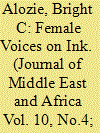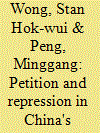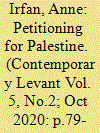|
|
|
Sort Order |
|
|
|
Items / Page
|
|
|
|
|
|
|
| Srl | Item |
| 1 |
ID:
167967


|
|
|
|
|
| Summary/Abstract |
This article traces a conflict that erupted in the late 19th century between the Armenians and the Süryani. This conflict, I argue, precipitated nothing less than the creation of the Süryani community itself. The dispute began over the key to a closet in the Church of the Holy Sepulchre, but it quickly evolved. Soon, the Armenians and the Süryani were clashing over holy places all around Jerusalem. The dispute centered on an Ottoman administrative arrangement which had been institutionalized nearly 400 years earlier: yamaklık. The Ottoman investigators, however, were unfamiliar with this archaic arrangement and had to be reeducated as to its terms and its history. The Süryani and the Armenians offered divergent accounts. Where the Armenians furnished hard documentation, however, the Süryani could produce only claims to tradition and local practice. In this article I argue that, through this protracted conflict, the Süryani came to understand the importance of the documentary record in a post-Tanzimat Ottoman world. They thus turned to an alternative strategy that would conform to this documentary sensibility and render their community visible to the state: a series of petitions with thousands of Süryani signatures from around the Ottoman Empire.
|
|
|
|
|
|
|
|
|
|
|
|
|
|
|
|
| 2 |
ID:
169990


|
|
|
|
|
| Summary/Abstract |
While historians have, of course, employed a host of documentary sources in reconstructing the colonial history of Nigeria, few have used petitions to understand the dynamic negotiations that occurred between the colonizer and the colonized. As a result, a vital primary source of history has been underutilized. Likewise, the voices of women lamentably have suffered the same fate as the use of petitions. This study seeks to fill this important gap by examining selected petitions and written correspondence between Igbo women and British officials in the period from 1892 to 1960. Continuously undermined by male-dominated colonial institutions and structures, African women acted in varied and complex manners from subtle to overt opposition, and sometimes violent resistance. One response was through petition-writing as women took to the pen to articulate their concerns. Petitioning became both a disabling and enabling force in exploring the relationship between subjectivity and power relations. How are scholars to understand the interactions between the often-neglected, ordinary female subjects and the British authorities? To what extent did their petitions shift the balance of patriarchal power and give voice to the otherwise “silent” women? Analysis of petitions written by women in colonial Igboland demonstrates how petition-writing gave females a subtle yet powerful voice, or agency, in a rigidly hierarchical colonial political system. This study argues that instead of simply looking at these petitions as another set of documents, they should be regarded as unique sources in which colonial subjects’ thoughts and desires are revealed. In addition, these neglected sources should be treated as an integral part of the complex power politics among colonial subjects as well as between them and officials. In thinking through these petitions, this case study reframes the sexual politics of petitions and challenges dominant, institutionalized gender ideologies that have defined women as nearly powerless and passive.
|
|
|
|
|
|
|
|
|
|
|
|
|
|
|
|
| 3 |
ID:
137206


|
|
|
|
|
| Summary/Abstract |
China has established a petition system to elicit information about grievances. However, the petition system may have perverse effects because it also reveals to the center the failure of local-level officials to resolve those grievances. Anecdotal accounts suggest that local officials have incentive to silence petitioners, often with the use of repression. In this article we study whether non–regime threatening petitions would provoke local governments' coercive response. To tackle the endogenous relationship between petition and repression, we take advantage of a natural experiment afforded by a change in hydroelectricity policy in China. In particular, we use provincial hydropower outputs as an instrument to identify citizen petitions. We find that citizen petitions significantly increase a province's spending on its repressive apparatus. The results suggest a paradoxical outcome of China's petition system: while it may help reduce the national authority's use of repression, it has caused an explosion of repression within the authoritarian system as a whole.
|
|
|
|
|
|
|
|
|
|
|
|
|
|
|
|
| 4 |
ID:
175142


|
|
|
|
|
| Summary/Abstract |
In the second half of the twentieth century, stateless Palestinian refugees regularly submitted petitions to international authorities, particularly the UN. In these petitions, the refugees demanded their rights and invoked the UN’s liberal internationalist discourse to assert the justice of their cause. This article explores what these petitions reveal about contentious politics among the Palestinian grassroots in the refugee camps. In so doing, it recasts Palestinian refugee camp communities as actors consciously engaged with international politics, and key drivers in internationalising the ‘Question of Palestine’. By unpacking the petitions’ internationalist aspects, the article also situates Palestinian refugee history within the broader context of post-war global governance. Finally, the analysis presented here challenges the state-centrism of existing historiography on petitioning, which examines the practice largely in relation to the growth of the state. By contrast, the case study of Palestinian petitioning shows that the practice can also be important in a setting of statelessness. This article therefore makes a series of contributions to understanding not only Palestinian political history, but also the practice of petitioning and the dynamics of post-war internationalism.
|
|
|
|
|
|
|
|
|
|
|
|
|
|
|
|
|
|
|
|
|